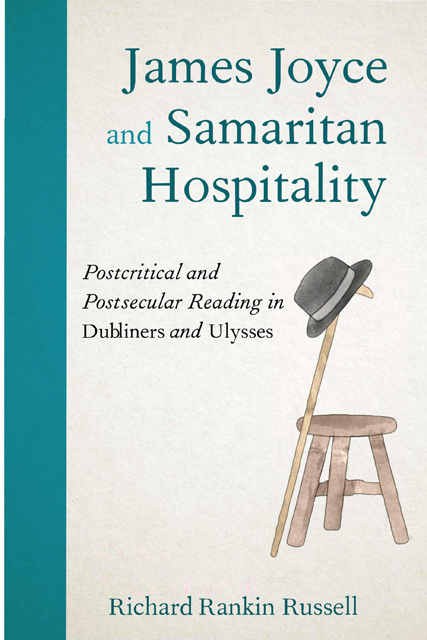Book contents
- Frontmatter
- Contents
- Preface and Acknowledgments
- List of Abbreviations
- Introduction
- 1 Haunted by Hospitality in “The Dead”
- 2 Joyce, Scripture, and Autobiographical Rescue Narratives
- 3 Rewriting the Good Samaritan Parable: The Fictional Rescue Narratives of “Grace” and “Circe”
- 4 Bloom as Stranger and Samaritan in “Cyclops,” “Oxen of the Sun,” and “Circe”
- 5 “In orthodox Samaritan fashion”: The Parabolic Encounter between Stephen and Bloom in “Eumaeus”
- 6 Home to “Ithaca” and “Penelope”: Bloom’s Hospitality and Stephen and Molly’s Reactions
- 7 Enfleshed Ethics and the Responsibility of the Reader in the Good Samaritan Parable and the “Nostos” of Ulysses
- Coda: “Go thou and do likewise”: Postcritical and Postsecular Reading through a Joycean Hermeneutics of Hospitality
- Works Cited
- Index
1 - Haunted by Hospitality in “The Dead”
Published online by Cambridge University Press: 25 April 2023
- Frontmatter
- Contents
- Preface and Acknowledgments
- List of Abbreviations
- Introduction
- 1 Haunted by Hospitality in “The Dead”
- 2 Joyce, Scripture, and Autobiographical Rescue Narratives
- 3 Rewriting the Good Samaritan Parable: The Fictional Rescue Narratives of “Grace” and “Circe”
- 4 Bloom as Stranger and Samaritan in “Cyclops,” “Oxen of the Sun,” and “Circe”
- 5 “In orthodox Samaritan fashion”: The Parabolic Encounter between Stephen and Bloom in “Eumaeus”
- 6 Home to “Ithaca” and “Penelope”: Bloom’s Hospitality and Stephen and Molly’s Reactions
- 7 Enfleshed Ethics and the Responsibility of the Reader in the Good Samaritan Parable and the “Nostos” of Ulysses
- Coda: “Go thou and do likewise”: Postcritical and Postsecular Reading through a Joycean Hermeneutics of Hospitality
- Works Cited
- Index
Summary
Joyce’s cast of characters in Dubliners, often from the margins of society, gives credence to Frank O’Connor’s claim in The Lonely Voice that rather than heroes, who often feature in novels, the short story has instead highlighted “submerged population groups,” and thus, that “[a]lways in the short story there is this sense of outlawed figures wandering about on the fringes of society,” resulting in “an intense awareness of human loneliness.” Vicki Mahaffey has cogently argued that “[e]ach of Joyce’s works reflects an increasingly sharper awareness that an appreciation of otherness … is only enhanced through encounters with the unfamiliar,” and we see this process of appreciating otherness beginning in Dubliners, most richly and deeply in “The Dead.” Immersing himself in so many lives, real and imagined, different from his own gave Joyce immense insights into appreciating the importance of hospitality toward others.
The two final stories in Dubliners, “Grace” and “The Dead,” celebrate Irish hospitality, the former through recourse to the Good Samaritan parable, the latter by affirming Irish hospitality more generally, through a New Year’s feast of food, conversation, music, and drink, and more specifically, through Gabriel Conroy finally allowing himself to imaginatively, empathetically enter into the life of a dead teenager whom his wife had cared for many years before. As we will see in Chapter 3, “Grace” actually reproduces the main lineaments of the Good Samaritan parable in its opening pages when the drunken Mr. Kernan falls down the steps of a pub into the men’s toilets and is rescued by a kindly cyclist and a helpful crowd. More startlingly, Joyce then reproduces verbatim parts of that parabolic opening in the “Circe” chapter of Ulysses to narrate the Good Samaritan Leopold Bloom’s rescue of the wounded traveler, Stephen Dedalus. Joyce criticism has tended to argue that the paralysis that runs throughout the volume is suddenly replaced with the theme of hospitality in “The Dead,” which was written after Joyce had come to appreciate Irish hospitality while living in Italy—as if the question of hospitality appeared suddenly, Athena-like, out of his head. Instead, he had been meditating upon aspects of hospitality in his life and his work for years.
- Type
- Chapter
- Information
- James Joyce and Samaritan HospitalityPostcritical and Postsecular Reading in Dubliners and Ulysses, pp. 19 - 41Publisher: Edinburgh University PressPrint publication year: 2023



